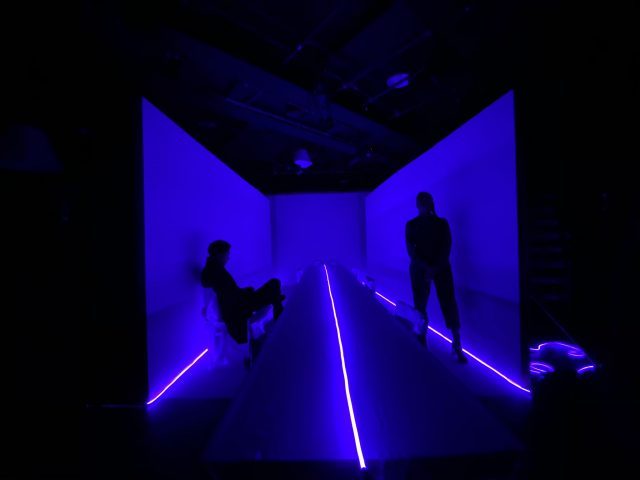
City Lyric Opera reinvents Brecht and Weill’s Threepenny Opera for online viewing and participation
Who: Sara LaFlamme, Sara LeMesh, Michael Parham, Rachelle Pike, Gretchen Pille, Mary Rice, Thomas Walters, Shane Brown, Geddy Warner, Shanelle Valerie Woods, the Curiosity Cabinet
What: Live virtual two-part performances
Where: City Lyric Opera Zoom
When: Thursday – Sunday, October 29 – November 15, viewing $12, live audience with toolkit $24, 8:00
Why: In Die Dreigroschenoper, or The Threepenny Opera, one of composer Kurt Weill’s goals in his collaboration with Bertolt Brecht was to bring opera, primarily an art form enjoyed through the centuries by the wealthy, snobbish elite and royalty, to the common people, making the story and music accessible and the production affordable. During the pandemic, technological online innovation has accomplished just that organically, with such shows as White Snake Projects’ excellent Alice in the Pandemic, which sent the protagonist, an ER nurse, down the rabbit hole in search of her coronavirus-infected mother, journeying through an animated video-game-like dark and empty wonderland, with the singers performing live (October 23-27, free); Orpheus Chamber Orchestra’s version of Beethoven’s Egmont, with the masked, socially distanced musicians playing in a New Jersey bandshell, accompanied by narrator Liev Schreiber and soprano Karen Slack (October 17-22, $15); Here Arts Center’s Zoom opera for all decisions will be made by consensus, a short work broadcast live on Facebook and Zoom about a Zoom meeting (April 24-26, free); and On Site Opera’s To My Distant Love, an adaptation of Beethoven’s six-song cycle, An die ferne Geliebte, delivered via email and cell phone (June – August, $40). Meanwhile, the Met, which will be closed through at least next summer, has been streaming more than 150 video and audio recordings of performances dating back to the 1950s (initially free, now $4.99 each or $14.99 monthly).
So it makes sense that City Lyric Opera (CLO), founded in 2016 by Megan Gillis and Kathleen Spencer to “provide a one-of-a-kind experience for audience members by welcoming them to the operatic art form without judgment, expectation, or financial burden,” is taking on The Threepenny Opera itself. “With the Dreigroschenoper we reach a public which either did not know us at all or thought us incapable of captivating listeners,” Weill explained way back when. “Opera was founded as an aristocratic form of art. If the framework of opera is unable to withstand the impact of the age, then this framework must be destroyed.” Weill and German playwright and librettist Brecht adapted John Gay’s 1728 The Beggar’s Opera, translated by Elisabeth Hauptmann, Brecht’s lover at the time, adding several songs based on works by fifteenth-century French poet and thief François Villon. The work, set during the Victorian era, premiered in Berlin in 1928; it was a Broadway failure in 1933, in a translation by Jerrold Krimsky and Gifford Cochran. However, Marc Blitzstein’s 1952-54 English translation became a hit and is the version we know today, and the one that will be used by CLO, which was scheduled to stage a full, in-person production this season. It has now been reimagined for the internet, being livestreamed in two back-to-back parts, Thursday to Sunday from October 29 to November 15. Tickets are $12 to watch and $24 with a live, interactive toolkit that incorporates the audience into the narrative. (Glow sticks, anyone?) The piece was developed at Here Arts Center, where director Attilio Rigotti and scenographer Anna Driftmier worked with the cast socially distanced in separate Covid performance boxes, each with its own design and lighting.
The company features baritone Justin Austin as Macheath, tenor Kameron Ghanavati as Filch/Smith/Ensemble, baritone Philip Kalmanovitch as Mr. Peachum, soprano Sara LaFlamme as Polly Peachum, soprano Sara LeMesh as Lucy Brown, baritone Michael Parham as Jackie “Tiger” Brown, mezzo-soprano Rachelle Pike as Mrs. Peachum, soprano Gretchen Pille as Dolly, mezzo-soprano Mary Rice as Bob/Berry, tenor Thomas Walters as Jake, baritone Shane Brown as Walt, tenor Geddy Warner as Matt, and mezzo-soprano Shanelle Valerie Woods as Jenny. The conductor and music director is Whitney George, leading the Curiosity Cabinet: Jared Newlen (reed I: clarinet, alto sax), Ben Solis (reed II: clarinet, alto sax), Hugh Ash (trumpet I), Clyde Dale (trumpet II), David Whitwell (trombone), Markus Kaitila (piano/celeste/harmonium), Joe Tucker (timpani, percussion), and Justin Rothberg (banjo, guitar). With its bitingly satirical view of capitalism and societal norms, The Threepenny Opera should feel right at home online in 2020, as we are all sheltering in place, in the midst of health and economic crises and a contentious presidential election where decency, humanity, wealth inequality, health care, and the social contract are on the ballot.